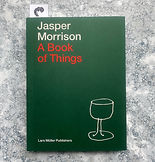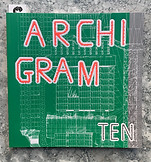NEW
YORK
ARCHITECTURE+ DESIGN
BOOK
CLUB
Join New York’s only architecture and design book club (that we know of!)
The New York Architecture + Design Book Club, organized by Head Hi and the design journal Untapped, is a lively public program and book subscription series that explores remarkable new titles in the field. The books’ authors, contributors and industry experts lead a discussion at each quarterly gathering, which seeks to build deeper connections between people, ideas, and the world in which we live.
HOW IT WORKS
HOW TO GET INVOLVED
UPCOMING EVENT
Join us on Tuesday, October 21, 6-8pm!
The second title for the 2025 New York Architecture + Design Book Club subscription and quarterly event series is Bruno Munari: Design and Visual Communication (Inventory Press).
A long-overdue English translation of Munari's seminal tract on the everyday value of architecture and design education, Design and Visual Communication (1968) fills a gap in Munari's output for the English-speaking world and provides a highly relevant guide to bridging architecture and design education and everyday life.
Published in 1968 after Munari was invited to the Carpenter Center at Harvard as a successor to György Kepes, the book transforms over 50 lessons, class materials and letters addressed to the city of Milan, into a book on the future of art, architecture and design. Conceived as a living volume, the book is written to inspire current and future designers to push beyond past events, however recent, and develop new tools to see and understand tomorrow's world.
Bruno Munari (1907-98) was an Italian artist, designer and inventor who contributed fundamentals to many fields of visual arts (painting, sculpture, film, industrial design, graphic design) in modernism, futurism, and concrete art and in nonvisual arts (literature, poetry) with his research on games, didactic method, movement, tactile learning, kinesthetic learning and creativity.
The book was published by Inventory Press in September 2025.
Questions about how the book club works? Email us at hello@headhi.net.
EVENT GUESTS
For the event on October 21, we are thrilled to be joined by Jeffrey Schnapp whose in depth contextual annotations accompany the facsimile reproduction of the original volume. As a Munari scholar and design historian, Schnapp has spent years unearthing the radical potential of critical historical material. His annotations and micro-interventions throughout the facsimile reprint seek to fulfill Munari's call for an evolution of the book in form and content and highlight how this work is as relevant today as when originally published.
In conversation with Schnapp will be Nontsikelelo Mutiti, Assistant Professor; Director of Graduate Studies in Graphic Design at Yale University. Mutiti is a Zimbabwean born designer, visual artist, and educator whose conceptual approach to design spans the mediums of print, moving-image, web design, fine art, and community engagement.
UNTAPPED BOOK REVIEW
Ahead of each event, Untapped publishes a review of the featured book, written by a leading design critic. The review of Bruno Munari: Design and Visual Communication was written by Jarret Fuller, a designer, writer, editor, and educator, assistant professor of graphic design at North Carolina State University and host of the podcast Scratching the Surface.
PAST NEW YORK ARCHITECTURE + DESIGN BOOK CLUB PICKS
2025
Jasper Morrison, A Book of Things
Bruno Munari: Design and Visual Communication
Featured Guests: Nick Olney and Jonathan Olivares
Review by George Kafka
Featured Guests: Jeffrey Schnapp and Nontsikelelo Mutiti
Review by Jarret Fuller
2024
Minerva Parker Nichols, In Search for a Forgotten Architect
Featured Guests: Margaret (Molly) Lester, William Whitaker, Heather Schumacher and Elizabeth Felicella
American Modern: Architecture; Community; Columbus, Indiana
Hélène Binet
Archigram Ten
Featured Guests: Barry Wark, Winka Dubbeldam and Michael Young
2023
The Advanced School of Collective Feeling
Featured Guests: Nile Greenberg, Matthew Kennedy, and John Sorensen-Jolink
A Dark, A Light, A Bright The Designs of Dorothy Liebes
Featured Guests: Susan Brown, Alexa Griffith Winton and Juan Jofre Lora
Touch Wood: Material, Architecture Future
Featured Guests: Carla Ferrer, Thomas Hildebrand, Celina Martinez-Cañavate and Neil Pederson
Stephen Burks Shelter in Place
ABOUT THE ORGANIZERS

Head Hi is an organization dedicated to art and design specializing in publications and cultural programming with an espresso bar located in Fort Greene, Brooklyn by the Navy Yard. We feature a curated selection of publications from around the globe. Working with local and international artists, designers, publishers, community members and organizations in various fields, Head Hi is a space for exploration and interaction that hosts talks, book launches, art shows, music performances and other events.

Untapped is a design journal that looks back to look forward. Their stories identify the most important knowledge about improving the built environment, and contextualize it for today and tomorrow.
We believe that both the near and distant past hold valuable insights for architects and designers. People have already solved, or are making headway on, many of the challenges the industry currently faces—but such achievements are often overlooked among an excess of data or in the pursuit of innovation, or when they are presented in convoluted ways. Our stories unpack and add a fresh critical perspective to those achievements, explaining why they’re significant and how they can be useful right now.
Untapped is not anti-innovation. We believe that the most efficient path to progress begins with building on what we know. This is the information that the journal is dedicated to gathering, making sense of, and reflecting on, and that we can’t afford to forget.
Collectively, Untapped’s stories form an encyclopedia of ideas: a gateway to knowledge that serves as a timeless, ever-growing resource for all.
www.untappedjournal.com
@untappedjournal















